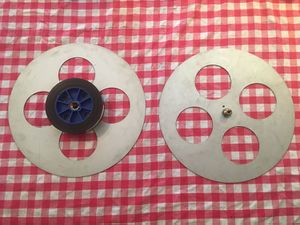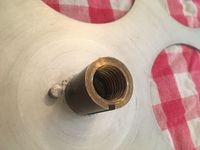| Welcome to Sprocket School! This project is maintained by volunteer editors. Learn more about how this works. |
Split reel: Difference between revisions
No edit summary |
No edit summary |
||
| (13 intermediate revisions by 3 users not shown) | |||
| Line 3: | Line 3: | ||
A '''split reel''' is used when handling film stored on a [[core]]. In exhibition settings, they are used to transfer film from storage on cores to [[Reels|show reels]] for projection. They exist for all [[film gauges]]. | A '''split reel''' is used when handling film stored on a [[core]]. In exhibition settings, they are used to transfer film from storage on cores to [[Reels|show reels]] for projection. They exist for all [[film gauges]]. | ||
==Use with projectors and automatic rewinds== | |||
The two halves of a split reel are held together by the threaded spindle in the center of the reel. When properly tightened, the two halves of the internal flange should be flush to each other and fully tightened. Care must be taken to ensure that the two halves of the reel are secure throughout use, and that the reel itself is in good repair. Because a seemingly-tight split reel can separate while in motion (potentially causing [[film damage]]), it is important not to leave them unattended on automatic rewinds, or use split reels for projection. | |||
Loosening can be avoided by considering how the wind orientation relates to the hub threading, and taking care that the reel is rotated in the direction that would tighten the threading rather than loosening it. However, because of the risk of miscalculation, and because [[show reel|show reels]] are widely available, split reels are not recommended for projection. | |||
== | ==Issues with the pin== | ||
[[File:Split-reel-nub.jpg|right|thumb|200px|Close-up of the center of a split reel, showing the pin.]] | |||
Split reels usually have a metal pin next to the hub that helps to hold the core in place. Sometimes you will run across a core and a split reel that will not fit together. You may need to try another split reel or get creative to fix this situation (whether using a [[trailer flange]] to transfer instead, carefully filing down the core or the pin, or something we haven't thought of). | |||
==Availability== | |||
Split reels can be purchased from [https://goldbergbrothers.com/movie-theater-products/projection-booth-equipment/reels/ Goldberg Brothers] through an authorized distributor like your cinema service company or [[Technical_consultants|technician]], or one of the below cinema supply companies. [[70mm]] split reels must be purchased through a service company or directly from Goldberg. | |||
*[https://www.urbanskifilm.com/ Urbanski Film] - 16mm and 35mm split reels | |||
*[https://www.christys.net/ Christys] - 16mm split reels only | |||
==See also== | ==See also== | ||
*[[Reels]] | *[[Reels]] | ||
*[[Core]] | *[[Core]] | ||
*[[Rewind bench]] | |||
*[[Trailer flange]] | |||
[[Category:Equipment]] | [[Category:Equipment]] | ||
[[Category: Tools]] | [[Category: Tools]] | ||
Latest revision as of 10:42, 22 April 2020

A split reel is used when handling film stored on a core. In exhibition settings, they are used to transfer film from storage on cores to show reels for projection. They exist for all film gauges.
Use with projectors and automatic rewinds
The two halves of a split reel are held together by the threaded spindle in the center of the reel. When properly tightened, the two halves of the internal flange should be flush to each other and fully tightened. Care must be taken to ensure that the two halves of the reel are secure throughout use, and that the reel itself is in good repair. Because a seemingly-tight split reel can separate while in motion (potentially causing film damage), it is important not to leave them unattended on automatic rewinds, or use split reels for projection.
Loosening can be avoided by considering how the wind orientation relates to the hub threading, and taking care that the reel is rotated in the direction that would tighten the threading rather than loosening it. However, because of the risk of miscalculation, and because show reels are widely available, split reels are not recommended for projection.
Issues with the pin

Split reels usually have a metal pin next to the hub that helps to hold the core in place. Sometimes you will run across a core and a split reel that will not fit together. You may need to try another split reel or get creative to fix this situation (whether using a trailer flange to transfer instead, carefully filing down the core or the pin, or something we haven't thought of).
Availability
Split reels can be purchased from Goldberg Brothers through an authorized distributor like your cinema service company or technician, or one of the below cinema supply companies. 70mm split reels must be purchased through a service company or directly from Goldberg.
- Urbanski Film - 16mm and 35mm split reels
- Christys - 16mm split reels only